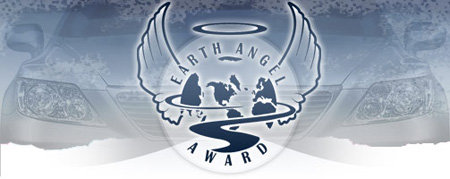| 

EARTH ANGEL APPLICANT SUBMISSION – Hyundai
1. Name 3 or more environmental initiatives your company sponsored in 2007.
TUCSON FCEV
Hyundai is planning to commercialize the Tucson FCEV (Fuel Cell Electric Vehicle) in Europe and the Far East by 2010. Our research confirms that fuel cell vehicles produce no harmful emissions into the environment and can be fueled by hydrogen generated from a renewable energy sources.
PATENTED CLEAN-DIESEL TECHNOLOGY
Hyundai is focusing efforts on developing high-performance environment-friendly next-generation powertrains including super-extreme low-pollution engines. In an attempt to produce even more fuel-efficient vehicles, Hyundai is developing the new 3.0 liter “S” V6 CRDi Diesel engine, which will produce up to 236 horsepower and 332 lb.-ft of torque.
Recycling Systems
Hyundai designers optimize the amount of recyclable materials to be used and how these materials can be put together to facilitate efficient disassembly at the end of a vehicle’s life, without sacrificing safety or performance.
Hyundai’s $58 million dollar Environmental Technological Research Centre in Seoul, is dedicated to researching environmental technologies for recycling reducing emissions and cleaner manufacturing.
Recycle initiatives are changing the way cars are being built. Hyundai Motor Manufacturing Alabama is nearly a 0% landfill facility. Almost all of the materials and parts utilized in manufacturing are recycled.
SUPER CLEAN ELANTRA
Thanks to advanced clean engine technology, most Elantras sold in California, Oregon and several Northeast states are certified as Partial Zero Emission Vehicles (PZEV) by the EPA and score high on the American Council for an Energy Efficient Economy (ACEEE)’s “Green Vehicle Guide to Green Cars.” Additionally, the ACEEE recognized the Hyundai Elantra as one of the top 12 “Greenest Vehicles” in the industry. The PZEV Elantra is as clean as many hybrid electric vehicles and helps Hyundai meet its environmental commitments. Outside of these “green” states, the Elantra is available in Ultra Low Emission Vehicle (ULEV) configurations.
2. Name 3 or more environmental initiatives your company will support in 2008.
Same as 1 plus we added:
I-BLUE CONCEPT
The i-Blue concept demonstrates a significant step toward commercialization of Hydrogen powered fuel cell vehicles. Hyundai is making tremendous efforts to achieve mass production within the next decade. The Hydrogen powered zero emissions concept was developed at Hyundai’s Design and Technology center in Chiba, Japan. The all-new platform is tailored to Hyundai’s third generation fuel cell technology, currently being developed at the company’s ECO-Technology Institute in Mabuk, Korea.
3. Name any awards your company has received for environmental progress in the past year.
In the J.D. Power and Associates 2006 Automotive Environmental Index (AEI) survey that was first established in 2006, Hyundai earned sixth place, outperforming Toyota, thereby firmly establishing the company’s image as a global leader in green technology.
4. Name all vehicles that your company currently has in production that are hybrid, diesel, solar powered, flex-fuel, natural gas, ethanol, or any other alternative fuels.
SUPER CLEAN ELANTRA
Thanks to advanced clean engine technology, most Elantras sold in California, Oregon and several Northeast states are certified as Partial Zero Emission Vehicles (PZEV) by the EPA and score high on the American Council for an Energy Efficient Economy (ACEEE)’s “Green Vehicle Guide to Green Cars.” Additionally, the ACEEE recognized the Hyundai Elantra as one of the top 12 “Greenest Vehicles” in the industry. The PZEV Elantra is as clean as many hybrid electric vehicles and helps Hyundai meet its environmental commitments. Outside of these “green” states, the Elantra is available in Ultra Low Emission Vehicle (ULEV) configurations.
5. Name all environmental organizations your company supports.
U.S. Department of Energy
Korea ’s Ministry of the Environment
California Fuel Cell Partnership (CaFCP) The CaFCP is a collaboration of 31 member organizations.
Chevron Corp.
UTC Power
California Air Resources Board
AC Transit
Southern California Edison
U.S. Army TACOM
6. In 100 words or less, what is your company position and mission on global warming?
Hyundai is dedicated to doing its part to help address the environmental challenges that confront our global community. At the same time, we realize that the health of our planet stretches beyond environmental issues to the general well-being of people everywhere.
At Hyundai, we believe in demonstrating our commitment to global warming by working towards the commercialization of eco friendly vehicles. Hyundai is also making tremendous efforts in clean production methods and the recycling of resources. The company is carrying out various activities for the purpose of minimizing the consumption of raw materials and fuel and to reduce the generation of environmentally harmful byproducts as much as possible. Our endeavors not only include the development of technology to curb the generation of waste-water, air pollution and waste matter, they also include the construction of a resource recycling system to recycle waste products during the manufacturing process into a reusable resource.
|